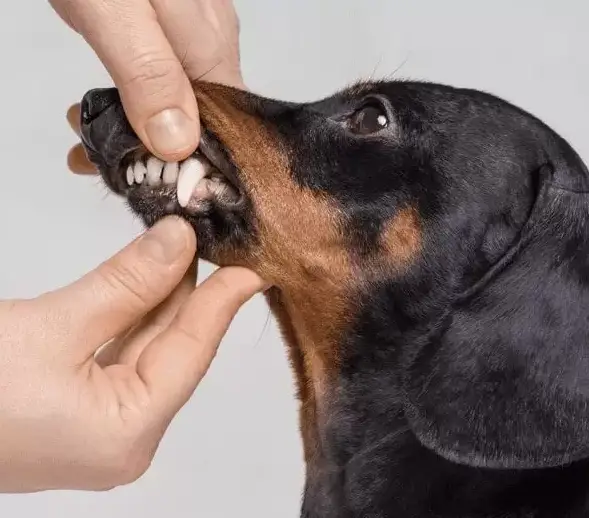Do you have at least some idea how many teeth do dachshunds have? There is a chance that you might not, since many people don’t.
Most people know about the long body of a dachshund, but not much about their dental well-being.
Anyway, it is a fascinating inquiry! We investigate Dachshunds’ dental health and the number of teeth they really have.
Dachshund Overview
The dachshund characteristic is that they are bred to hunt badgers, so they have short legs and long bodies perfectly made to tunnel into burrows.
They have a profound chest which gives them more lung limit than different canines of their size. This gives them the endurance to chase after prey.
Also, they have long droopy ears and long noses. These attributes make the dachshund stand apart from other canine varieties.
So how many teeth do dachshunds have? The answer is 42.
Dachshund Teeth
The 42 teeth breakdowns as 12 incisors, four canines, 16 premolars and 10 molars (two of these are wisdom teeth).
Very much like people, the Dachshund will have two sets of teeth in their life.
When dachshunds are puppies, their first set of main teeth are called deciduous teeth (commonly referred to as baby teeth). They will fall out when they get past the age of six months.
The second set of permanent teeth comes in when they are about a year old. Then another six months after that, they will have a full arrangement of 42 teeth.
Dental Issues In Dachshunds
While dachshunds have a moderately decent number of teeth contrasted with other canine varieties, they can have dental issues.
This is due to their long slender noses and small mouth, which can overcrowd their teeth.
This tooth crowding can lead to them getting plaque and more chance for gum disease.
Because of this, it is important to take care of your dachshund’s teeth.
You should brush your dachshund’s teeth on a regular basis and have them get routine checkups by your vet.
Dachshunds do have overall decent dental health, as long as you brush their teeth often, so they don’t get tartar and plaque buildup.
This will keep their teeth and gums strong and they normally don’t have tooth decay.
What Size Are Dachshund Teeth?
The dachshund’s teeth are smaller than many other dog breeds of the same size.
But their teeth are quite sharp and very strong. Since they were bred as hunting dogs, their teeth were made for tearing and grinding on meat and bone.
How Many Teeth Do Dachshunds Have When They Are Puppies?
The dachshund puppy will normally lose their baby teeth in about six months. Their new permanent teeth will push through their gums and cause their baby teeth to fall out.
Just like human babies, teething can be uncomfortable and you will need to make sure you give them chew toys and doggy bones to help with this discomfort.
Your dachshund puppy will be chewing a lot more at this time and you want to make sure they don’t chew on your shoes, furniture, or other household items.
What are the different types of teeth in a dachshund and what are they used for?
The dachshund’s teeth in front of their mouth are called the incisors and are used for grabbing food.
The long teeth in front are their fangs, which are sharp and used for tearing and puncturing meat.
The teeth in the back of their mouths are the molars which are made to grind and crush food.
Cleaning Dachshund Teeth
Keeping your dachshund’s teeth clean and healthy.
As stated previously you need to brush their teeth on a regular basis.
Make sure you use dog-safe toothpaste that not only helps remove plaque but has a good taste as well.
I remember the first dog toothpaste I purchased, and my dachshund couldn’t stand the taste of it.
Then I switched to a new brand and he loved the taste of that. In fact, he looked forward to getting his teeth brushed as he enjoyed the flavor.
That made it really easy to brush his teeth.
Have your vet check their teeth every time you take them in for their checkups and shots.
Doing this will help prevent any dental issues that could be expensive.
How to properly clean a dog’s teeth
First, make sure you use a soft-bristled toothbrush. And since they have a long narrow nose and mouth, you need to make sure you reach way in the back to get at the molars when you brush.
Secondly, make sure you purchase a dog-safe toothpaste and one that not only is good for your dog but has a good taste to it.
Regular tooth brushing and vet checkups will keep your dachshund’s teeth and gums healthy and avoid major dental problems in the future.

